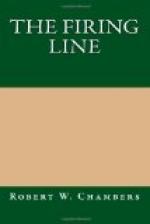So absorbed was she in her hammering that at first she neither heard nor saw Portlaw when he finally ventured to advance; and when she did she dropped the tack hammer in her astonishment.
He dismounted, with pain, to pick it up, presented it, face wreathed in a series of appealing smiles, then, managing to scale the side of his horse again, settled himself as comfortably as possible for the impending conflict.
But Alida Ascott, in her boyish riding breeches and deep-skirted coat, merely nodded her thanks, took hold of the hammer firmly, and drove in more tacks, paying no further attention to William Van Beuren Portlaw and his heart-rending smiles.
It was very embarrassing; he sidled his horse around so that he might catch a glimpse of her profile. The view he obtained was not encouraging.
“Alida,” he ventured plaintively.
“Mr. Portlaw!”—so suddenly swinging on him that he lost all countenance and blurted out:
“I—I only want to make amends and be friends.”
“I expect you to make amends,” she said in a significantly quiet voice, which chilled him with the menace of damages unlimited. And even in his perturbation he saw at once that it would never do to have a backwoods jury look upon the fascinating countenance of this young plaintiff.
“Alida,” he said sorrowfully, “I am beginning to see things in a clearer light.”
“I think that light will grow very much clearer, Mr. Portlaw.”
He repressed a shudder, and tried to look reproachful, but she seemed to be very hard-hearted, for she turned once more to her hammering.
“Alida!”
“What?”—continuing to drive tacks.
“After all these years of friendship it—it is perfectly painful for me to contemplate a possible lawsuit—”
“It will be more painful to contemplate an actual one, Mr. Portlaw.”
“Alida, do you really mean that you—my neighbour and friend—are going to press this unnatural complaint?”
“I certainly do.”
Portlaw shook his head violently, and passed his gloved hand over his eyes as though to rouse himself from a distressing dream; all of which expressive pantomime was lost on Mrs. Ascott, who was busy driving tacks.
“I simply cannot credit my senses,” he said mournfully.
“You ought to try; it will be still more difficult later,” she observed, backing her horse so that she might inspect her handiwork from the proper point of view.
Portlaw looked askance at the sign. It warned people not to shoot, fish, cut trees, dam streams, or build fires under penalty of the law; and was signed, “Alida Ascott.”
“You didn’t have any up before, did you?” he asked innocently.
“By advice of counsel I think I had better not reply, Mr. Portlaw. But I believe that point will be brought out by my lawyers—unless”—with a brilliant smile—“your own counsel sees fit to discuss it.”




